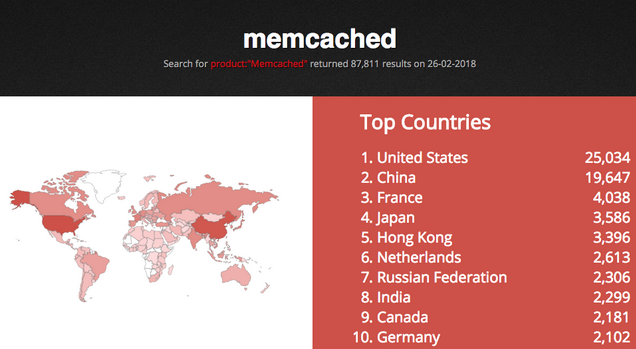Malicious actors have started abusing the memcached protocol to launch distributed denial-of-service (DDoS) attacks, Cloudflare and Arbor Networks warned on Tuesday.
Memcached is a free and open source distributed memory caching system designed to work with a large number of open connections. Clients can communicate with memcached servers via TCP or UDP on port 11211.
Cloudflare noticed in recent days that memcached has been abused for DDoS amplification attacks, and so have Arbor Networks and Chinese security firm Qihoo 360. Cloudflare has dubbed this type of attack Memcrashed.
Attackers are apparently abusing unprotected memcached servers that have UDP enabled. Similar to other amplification methods, the attacker sends a request to the targeted server on port 11211 using a spoofed IP address that matches the IP of the victim. The request sent to the server is just a few bytes, but the response can be tens of thousands of times bigger, resulting in a significant attack.
The largest memcached DDoS attack observed by Cloudflare peaked at 260 Gbps, but Arbor Networks reported seeing attacks that peaked at 500 Gbps and even more.
“I was surprised to learn that memcached does UDP, but there you go!” said CloudFlare’s Marek Majkowski. “The protocol specification shows that it’s one of the best protocols to use for amplification ever! There are absolutely zero checks, and the data WILL be delivered to the client, with blazing speed! Furthermore, the request can be tiny and the response huge (up to 1MB).”
Arbor Networks noted that the type of queries used in these attacks can also be directed at TCP port 11211, but since TCP queries cannot be reliably spoofed, this protocol is less likely to be abused. The company pointed out that Chinese researchers warned about the possibility of attacks abusing memcached in November.
In the attacks seen by Cloudflare, attackers abused servers from all around the world, but mostly from North America and Europe. A majority of the servers are hosted by OVH, DigitalOcean and Sakura.
The attacks monitored by the content delivery network (CDN) came from roughly 5,700 unique IPs associated with memcached servers, but experts expect to see much larger attacks in the future considering that Shodan shows nearly 88,000 open servers. A majority of the exposed systems are in the United States, followed by China and France.

“Arbor’s current assessment is that, as with most other DDoS attack methodologies, memcached DDoS attacks were initially – and for a very brief interval – employed manually by skilled attackers; they have subsequently been weaponized and made available to attackers of all skill levels via so-called ‘booter/stresser’ DDoS-for-hire botnets,” Arbor Networks researchers said in a blog post. “The rapid increase in the prevalence of these attacks indicates that this relatively new attack vector was weaponized and broadly leveraged by attackers within a relatively short interval.”
Cloudflare recommends disabling UDP support unless it’s needed, and advised system administrators to ensure that their servers are not accessible from the Web. Internet service providers (ISPs) can also contribute to mitigating these and other types of amplification attacks by fixing vulnerable protocols and preventing IP spoofing.
Related: DDoS Attacks Abuse TFTP for Reflection and Amplification
Related: RPC Portmapper Abused for DDoS Attack Reflection, Amplification
Related: Large DNS Text Records Used to Amplify DDoS Attacks
Related: mDNS Can Be Used to Amplify DDoS Attacks: Researcher












